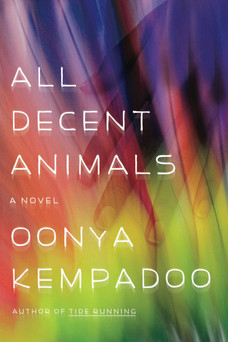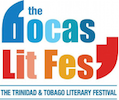Book of the Month - November 2013

It is said that fiction writing is never really fiction. After all some of the best literary works are borne from personal experiences and observation. Oonya Kempadoo pulls her readers into a colourful world filled with dynamic characters and captivating story-telling set against the backdrop of the ‘culturally-rich’ island of Trinidad. CaribLit caught up with Kempadoo to discuss All Decent Animals, this month’s Book club selection. All Decent Animals is a love story in many ways, capturing vivid cultural and island images, relationships and the loyalties that hold them together.
CaribLit: Tell us about the title. Was that your first choice? How was it developed?
OK: I had decided on the title long before I knew what exactly the book was about. [I think] that at our best, we are all just decent animals anyway. Even though we refer to animals as lesser beings, their qualities and the way they live with laws of nature sometimes make them more humane. This decision was also connected to wanting to use animal characteristics for various characters without it being derogatory and so the conversation between the two main characters, where the title occurs in the text, had to be woven in carefully.
CaribLit: Was the experience of writing All Decent Animals different than writing your other books Buxton Spice and Tide Running?
OK: It was much more difficult because of the subject matter and the urban, complex character of Port of Spain. Compared to the rural setting and ease with the characters of my first two novels, this presented a challenge that at once forced me to keep at it and at the same time created a lot of conflict and deeper questions within me. Eventually, I had to acknowledge with this book that I need to keep writing and have many more stories to share.
CaribLit: Is your main character Ata a version of you? What inspired her development?
OK: She is based on my experience with Port of Spain and work in Carnival. It was a time that shaped my creativity then and writing about it much later has helped me to determine my direction as a creative writer.
CaribLit: Why the topic of HIV and AIDS now? Is this a topic you will highlight more in the future?
OK: I lost a few good friends to this disease and this is why it was compelling to write and at the same time very difficult, it took ten years. The arts community in the 80’s in Trinidad lost many and by the time I had finished the manuscript I realised that for the number of people who died of HIV/AIDS in the West, not much about this appears in literature. Even though now the HIV [medications] prevent the loss of life, the complications and choices that an individual has to face and the stigma of the disease still makes it a topic that needs more voices. I don’t plan fiction writing by topic however, so can’t say if I would write more on this or not.
CaribLit: Describe your experience selecting a publisher. Or did your publisher find you?
OK: This book was part of a two book contract (though long overdue!) with my second novel, Tide Running.
CaribLit: What do you think attracted your publisher to All Decent Animals? What made you say yes?
OK: The editor who acquired this was attracted to the language, Trinidad content and characters and I was flattered when I realized that he was also Derek Walcott’s editor!
CaribLit: Victor LaValle describes you as “…a lyrical poet hiding in novelist form…” and Jerome Maunsell says your “language leaps off the page.” Tell us about your reaction when you heard these accolades.
OK: I learn a lot about my writing from critics and of course was delighted by the compliments. How a work is received by others is what completes the literary experience. The writer’s work is one part but any reader’s interpretation is the rest of the journey that makes the process rewarding.
CaribLit: What is your advice to aspiring authors, especially as it relates to the use of language and character development?
OK: My advice is something that they may have heard before. Stay true to the character and their voice as much as possible. Try not to censor the flow or rhythm of the language or actions as you write for structure sake. Rather, in editing, ensure that it is as close as you can get it to what you imagined or what you remember. Capturing the ‘reality’ of that world is your obligation.
CaribLit: On a recent panel at the Brooklyn Book Festival, you alluded to the importance of Caribbean authors in the diaspora telling their own stories. Tell us why this is so critical.
OK: I mean all Caribbean authors, whether in the diaspora or at home; writing contemporary fiction in our voices keeps the evolution of Caribbean literature alive and keeps pushing the boundaries of how we write and what we write about to include for example, digital stories and genre writing.
CaribLit: What are you reading now?
OK: Children of the Days: A Calendar of Human History by Eduardo Galeano. It makes history beautifully human and poetic.
CaribLit: What is the name of the last book you read written by someone of Caribbean heritage?
OK: This is How You Lose Her by Junot Diaz.
All Decent Animals is Kemapdoo’s third novel. The book is published by Farrar, Straus and Giroux, which is based in the United States.
CaribLit: Tell us about the title. Was that your first choice? How was it developed?
OK: I had decided on the title long before I knew what exactly the book was about. [I think] that at our best, we are all just decent animals anyway. Even though we refer to animals as lesser beings, their qualities and the way they live with laws of nature sometimes make them more humane. This decision was also connected to wanting to use animal characteristics for various characters without it being derogatory and so the conversation between the two main characters, where the title occurs in the text, had to be woven in carefully.
CaribLit: Was the experience of writing All Decent Animals different than writing your other books Buxton Spice and Tide Running?
OK: It was much more difficult because of the subject matter and the urban, complex character of Port of Spain. Compared to the rural setting and ease with the characters of my first two novels, this presented a challenge that at once forced me to keep at it and at the same time created a lot of conflict and deeper questions within me. Eventually, I had to acknowledge with this book that I need to keep writing and have many more stories to share.
CaribLit: Is your main character Ata a version of you? What inspired her development?
OK: She is based on my experience with Port of Spain and work in Carnival. It was a time that shaped my creativity then and writing about it much later has helped me to determine my direction as a creative writer.
CaribLit: Why the topic of HIV and AIDS now? Is this a topic you will highlight more in the future?
OK: I lost a few good friends to this disease and this is why it was compelling to write and at the same time very difficult, it took ten years. The arts community in the 80’s in Trinidad lost many and by the time I had finished the manuscript I realised that for the number of people who died of HIV/AIDS in the West, not much about this appears in literature. Even though now the HIV [medications] prevent the loss of life, the complications and choices that an individual has to face and the stigma of the disease still makes it a topic that needs more voices. I don’t plan fiction writing by topic however, so can’t say if I would write more on this or not.
CaribLit: Describe your experience selecting a publisher. Or did your publisher find you?
OK: This book was part of a two book contract (though long overdue!) with my second novel, Tide Running.
CaribLit: What do you think attracted your publisher to All Decent Animals? What made you say yes?
OK: The editor who acquired this was attracted to the language, Trinidad content and characters and I was flattered when I realized that he was also Derek Walcott’s editor!
CaribLit: Victor LaValle describes you as “…a lyrical poet hiding in novelist form…” and Jerome Maunsell says your “language leaps off the page.” Tell us about your reaction when you heard these accolades.
OK: I learn a lot about my writing from critics and of course was delighted by the compliments. How a work is received by others is what completes the literary experience. The writer’s work is one part but any reader’s interpretation is the rest of the journey that makes the process rewarding.
CaribLit: What is your advice to aspiring authors, especially as it relates to the use of language and character development?
OK: My advice is something that they may have heard before. Stay true to the character and their voice as much as possible. Try not to censor the flow or rhythm of the language or actions as you write for structure sake. Rather, in editing, ensure that it is as close as you can get it to what you imagined or what you remember. Capturing the ‘reality’ of that world is your obligation.
CaribLit: On a recent panel at the Brooklyn Book Festival, you alluded to the importance of Caribbean authors in the diaspora telling their own stories. Tell us why this is so critical.
OK: I mean all Caribbean authors, whether in the diaspora or at home; writing contemporary fiction in our voices keeps the evolution of Caribbean literature alive and keeps pushing the boundaries of how we write and what we write about to include for example, digital stories and genre writing.
CaribLit: What are you reading now?
OK: Children of the Days: A Calendar of Human History by Eduardo Galeano. It makes history beautifully human and poetic.
CaribLit: What is the name of the last book you read written by someone of Caribbean heritage?
OK: This is How You Lose Her by Junot Diaz.
All Decent Animals is Kemapdoo’s third novel. The book is published by Farrar, Straus and Giroux, which is based in the United States.
© 2012 - 2013 CaribLit. All rights reserved.



